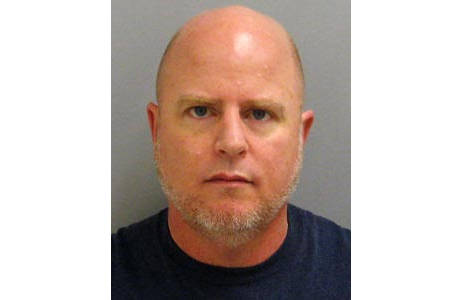KAILUA-KONA — Former Hawaii County police officer Michael Dubberstein’s attorney has filed a motion to dismiss an assault charge filed in connection with a 2014 road rage incident in Ka’u. ADVERTISING KAILUA-KONA — Former Hawaii County police officer Michael Dubberstein’s
KAILUA-KONA — Former Hawaii County police officer Michael Dubberstein’s attorney has filed a motion to dismiss an assault charge filed in connection with a 2014 road rage incident in Ka’u.
On Tuesday, Dubberstein’s attorney Brian De Lima filed a 104-page motion with the 3rd Circuit Court indicating the indictment in the case should be dismissed because the state presented prejudicial, false, misleading and hearsay testimony during the grand jury proceedings, which improperly influenced the grand jury.
On Wednesday, Deputy Prosecutor Stephen Frye filed a motion in opposition to dismiss the indictment.
“The defendant’s motion contains bold accusations that the state allowed perjured and false testimony to be presented during the grand jury proceedings,” according to Frye’s filing. “However, the defendant’s motion fails to analyze with specificity how the statements may have been false.”
Judge Melvin Fujino will review the motion at 2:30 p.m. today.
The former patrol officer was charged with first-degree assault in connection to a road rage incident in Ocean View that occurred Feb. 12, 2014.
Originally reported as a reckless driver, court documents filed by De Lima state, police reports indicate the complainant, James Gonzales, claimed Dubberstein was driving recklessly while traveling home.
Dubberstein claimed Gonzales was in rage after the defendant passed his vehicle, “angrily gesturing and honking his horn.”
Documents filed state Dubberstein successfully passed the complainant and went to the Malama Market to do grocery shopping.
“Gonzales and his wife arrived later at the Malama Market and observed Dubberstein’s parked vehicle,” according to the court documents. “While parked in the opposite side of the parking lot, Gonzales left his wife in the vehicle and proceeded to the area where Dubberstein’s vehicle was parked.”
Court documents indicate Dubberstein and witness Russell Spencer confirmed Gonzales made comments to the former police officer about road rage.
“Dubberstein did not respond but placed his groceries in the vehicle and attempted to get into the vehicle,” the documents state.
The filing goes on to indicate it was Gonzales that pushed the car door onto Dubberstein’s leg, causing the defendant to react.
“Gonzales admitted he was the person that first pushed Dubberstein when he exited the vehicle,” court documents state. “It was then at Dubberstein stated he was punched in the face and exchanged blows with Gonzales, which resulted in Dubberstein taking Gonzales to the ground causing injuries to Gonzales.”
According to De Lima’s filing, the state presented the grand jury with false and misleading information when it allowed Gonzales’ wife, Evelyn, to testify she was able to hear words exchanged between the men despite the fact she was sitting in a vehicle across the parking lot.
The filing also alleges the state allowed Gonzales’ wife to make statements that differed from what she gave in the police report at the time of the incident. She also made statements that contradicted with Gonzales.
It also says the state presented testimony that Gonzales had cancer, “which was done for the sole purpose of attempting to gain sympathy for the complainant, as there is no probative value for introducing such evidence to the grand jury.”
The filing also accuses the state of presenting false and misleading testimony about the defendant’s injuries, hearsay evidence regarding statements made by Gonzales and an unidentified witness. It also indicates the state failed to present testimony to the grand jury that Gonzales had recent convictions for harassment.
Frye’s filing on Wednesday disagrees with De Lima on all points. In the filing, he said the testimony of Evelyn Gonzales was substantially similar to that recorded by police on the day of the incident.
“There’s nothing to indicate that she lied at the grand jury proceedings,” the document states.
In addition, according to the prosecution’s filing, there is nothing on the record to indicate Spencer gave false or misleading testimony.
The state’s filing also points out the defendant failed to cite case law supporting why an indictment should be dismissed for presenting evidence that had no probative value.
“The defendant’s motion also argues that the indictment should be dismissed because testimony was offered that indicated the defendant was a former police offer and the defendant had cancer,” according to the filing. “This evidence assisted the grand jury in knowing why the complainant was not present. It was also necessary context to establish his unavailability.”
Frye’s filing also goes on to state that the defendant’s motion complains evidence that Dubberstein was a former police officer is prejudicial because of issues related to police brutality in other jurisdictions.
“There is no evidence of this in the record,” the state’s filing indicates. “The defendant’s prior experience as a police officer is relevant to the issue how much force was necessary.”
In conclusion, the state’s filing indicates, the remainder of the defendant’s arguments do not appear to be well-grounded in the law.
“The defendant complains of hearsay being admitted when the statement complained does not fit the definition of hearsay and would be properly brought before the grand jury even if it were hearsay,” according to the filing.



